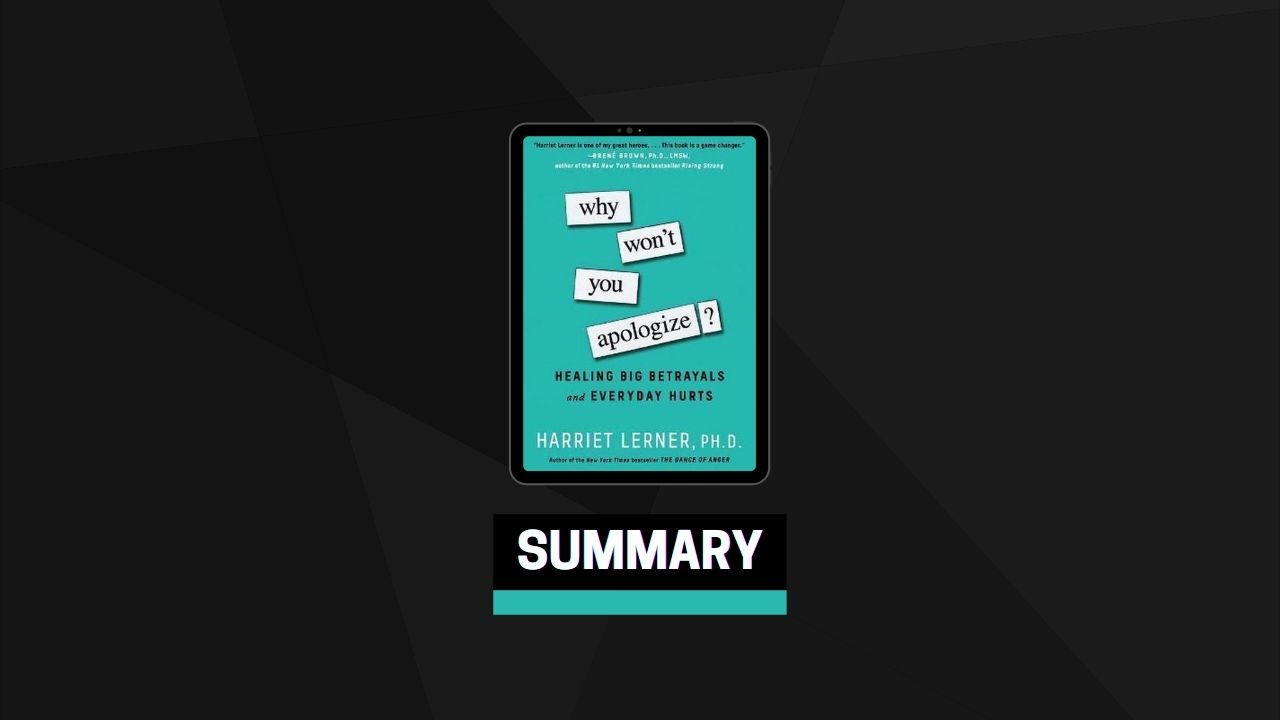Three Ways to Ruin an Apology
RAISING OUR “BUT” CONSCIOUSNESS
More than anything, the hurt party wants to hear an apology that is heartfelt. When “but” is tagged on to an apology, it undoes the sincerity. Watch out for this sneaky little add-on. It almost always signals an excuse or cancels out the original message. It doesn’t matter if the statement you make after the “but” is true—it makes the apology false. It says, in effect, “Given the whole situation, my rudeness (or lateness, or sarcastic tone, or what-have-you) is pretty understandable.”
“I’M SORRY YOU FEEL THAT WAY”
“I’m sorry you feel that way” is another common pseudo-apology. A true apology keeps the focus on your actions—and not on the other person’s response.
Watch Out for “IF”
The little word if also invites the other person to question their own reactions. Watch out for, “I’m sorry if I was insensitive,” or “I’m sorry if you took what I said as offensive.” Almost any apology that begins with “I’m sorry if . . .” is a non-apology. Try instead, “The comment I made was offensive. I’m sorry I was insensitive and I want you to know that it won’t happen again.”
Over-Apologizing
Sorry for the delay, Sorry for the confusion, Sorry for whatever.
What drives over-apologizing? We can never know for sure. It may be a reflection of low self-esteem, a diminished sense of entitlement, an unconscious wish to avoid any possibility of criticism or disapproval before it even occurs, an excessive wish to placate and please, some underlying river of shame, or a desire to show off what a well-mannered Brownie Scout one is. Or, alternatively, the reflexive “I’m sorrys” may be nothing more than a verbal tick, a little self-effacing girl-thing that developed long ago, and now is something like an automatic hiccup.
If you over-apologize, tone it down. If you’ve forgotten to return your friend’s salad bowl, don’t apologize numerous times, as if you ran over her kitten. Over-apologizing creates distance and interrupts the normal flow of conversation. It will irritate your friends, and also make it harder for them to hear you when you offer an apology that you really need to give.
The Good Enough Apology
The formula for a good enough apology seems pretty straightforward. In his book Effective Apology, business expert John Kador’s definition is as good as any I’ve seen: “We apologize when we accept responsibility for an offence or grievance and express remorse in a direct, personal and unambiguous manner, offering restitution and promising not to do it again.” A good apology includes the words “I’m sorry” without “ifs,” “buts,” or any manner of undoings, obfuscations, and the like. Yet we’ve seen how easy it is to slip into language that distances us from responsibility and that muddles exactly what we are apologizing for.
Apologizing Under Fire
It’s impossible to overstate how difficult it is to shift out of defensive mode. When someone approaches us in an angry or critical way, our automatic set point is listening for what we don’t agree with. It’s so automatic that it takes motivation, courage, and goodwill to observe our defensiveness and practice stepping aside from it.
Nondefensive listening is at the heart of offering a sincere apology. Here are twelve points to keep in mind when we’re on the receiving end of criticism.
- Recognize your defensiveness.
- Breathe.
- Listen only to understand
- Ask questions about whatever you don’t understand
- Find something you can agree with.
- Apologize for your part.
- Let the offended party know he or she has been heard and that you will continue to think about the conversation.
- Thank the critical person for sharing his or her feelings.
- Take the initiative to bring the conversation up again.
- Draw the line at insults.
- Don’t listen when you can’t listen well.
- Define your differences.
Wholehearted listening requires us to quiet our mind, open our heart, and ask questions to help us to better understand. It also requires that we stop ourselves from interrupting, making corrections, and saying things that leave the other person feeling unheard or cut short. It requires us to get past our defensiveness when the critical party is saying things that we don’t agree with and don’t want to hear, and instead let her voice and her pain affect and influence us.
The Secret Life of the Non-Apologizer
Perhaps the number one risk factor for being a non-apologizer is being born male, just as the number one risk factor for being an over-apologizer is being born female. Research suggests that more men than women just won’t go there when it comes to apologizing—a finding that holds true across cultures.
Most parents don’t intentionally set out to raise their sons to be a James Bond or a man-of-steel-type figure, but none of us is entirely free of gender stereotypes. While feminism has challenged our old gender roles, they remain very much with us. “Be a man!”
Be strong, don’t cry, don’t be too soft, sensitive, or vulnerable, don’t be a sissy . . . in a word, don’t be like a girl. In contrast, the command to “Be a woman!” has no meaning at all, although the dictate to “Be a lady!” is perfectly clear.
A poem by Rudyard Kipling captures a vision of masculinity that is still prominent in much of our society today.
If neither foes nor loving friends can hurt you,
If all men count with you, but none too much;
If you can fill the unforgiving minute
With sixty seconds’ worth of distance run,
Yours is the Earth and everything that’s in it,
And—which is more—you’ll be a Man, my son!
The truth of the matter is quite different. If your loving friends can’t hurt you, and if no one counts too much, you’re flatly out of connection with yourself and with others. And if you have to fill the difficult minutes with the “distance run,” you’ll never sit still long enough to notice the disconnection, nor will you have an authentic center to even begin to think about how your behavior hurts or diminishes others. This “manly” way of being in the world does not lend itself to offering a heartfelt apology when an apology is due.
“He’s So Defensive!” What Do You Have to Do With It?
Don’t demand an apology. Requesting an apology is fine, but demanding one is counterproductive. On the couples front, psychologist Ellen Wachtel notes, “Demanding an apology can be harmful. Your partner may feel as if he or she is being asked to grovel. There is something humiliating about being forced to apologize on demand. It can make the apologizer feel like a child or like someone lacking in self-respect.”
People do not respond well to being told how they should think, feel, or behave—and that includes being told to apologize. You’ll have a better chance of getting through if you don’t try to “make” the other person say they’re sorry. And if the other person apologizes because you’ve demanded it, his or her words won’t be sincerely felt. Instead, try to model the heartfelt, spontaneous apology that you would like to receive. And be generous in accepting the apology offered to you in good faith.
“You Need to Forgive” and Other Lies That Hurt You
You do not need to forgive a person who has hurt you in order to free yourself from the pain of negative emotions. You can even reach a place of love and compassion for the wrongdoer without forgiving a particular action or inaction. You are not a less loving or whole person if there are certain things you do not forgive, and certain people whom you choose not to see. Perhaps you are even a stronger or more courageous person if you have leftover anger, whether from one violation or countless little micro-violations, even as you move on.
Most importantly, it is no one else’s job—not that of your therapist, mother, teacher, spiritual guide, best friend, or relationship expert—to tell you to forgive—or not to.
How to Find Peace
Countless self-help books, blogs, and seminars promise relief from suffering, when pain and suffering are as much a part of life as happiness and joy. The only way to avoid being mistreated in this world is to fold up in a dark corner and stay mute. If you go outside, or let others in, you’ll get hurt many times. Ditto if you’ve grown up in a family rather than being raised by wolves. Some people will behave badly and will not apologize, repair the harm, or care about your feelings.
There are countless resources out there to aid us with the process of letting go, when we have the will and intention to move in this direction. Therapy, meditations, medication, yoga, religious and spiritual practices, exercise, writing and making art, breathing and relaxation exercises, and being useful to others, are just a few of the available paths and concrete strategies to help us stop nursing past grievances and live more peacefully in the present.
How do you find peace when the hurt you’ve suffered will never be acknowledged or repaired by the one who inflicted it? The answer is as simple as the challenge is daunting. Any way you can.
The Two Most Powerful Words in the English Language
“I’m sorry” are the two most healing words in the English language. When they are spoken as part of a wholehearted apology, these words are the greatest gift we can give to the person we have offended. Our apology can help free the hurt person from life-draining anger, bitterness, and pain. It validates their sense of reality by affirming that, yes, their feelings make sense, we get it, and we take full responsibility for our words and actions (or our failure to speak or act). A heartfelt apology allows the hurt party the space to explore the possibilities of healing instead of just struggling to make sense of it all.
The apology is also a gift to our self. Our self-respect and level of maturity rest squarely on our ability to see ourselves objectively, to take a clear-eyed look at the ways that our behavior affects others, and to acknowledge when we’ve acted at another person’s expense. The good apology also earns us respect in the eyes of others, even though we may fear the opposite.
Finally, the good apology is a gift to the relationship. Two people can feel secure in the knowledge that if they behave badly, even fight terribly, they can repair the disconnection. We strengthen our relationships when others know that we’re capable of reflecting on our behavior, and that we’ll listen to their feelings and do our best to set things right.


